This quote is a reflection of Marx’s view on the capitalist system, where he suggests that if a worker uses his free time for his personal growth or enjoyment, it is seen as a theft from the capitalist who could have otherwise exploited that time for profit. Marx believed that under capitalism, the value of a worker is primarily defined by their productive capacity and the time they spend working. Hence, any time not spent on labour is seen as a loss of potential profit for the capitalist.
In essence, Marx is highlighting the tension between personal time and work time in a capitalist economy. The quote suggests that under capitalism, workers are discouraged from pursuing personal interests, leisure, or self-improvement activities because these do not directly contribute to the capitalist’s profit.
Applying this idea to today’s world, we can see the ongoing struggle to balance work and personal life. With the rise of technology and remote work, especially during the COVID-19 pandemic, the boundaries between work and personal life have blurred. Some employers expect their employees to be available round the clock, infringing on their personal time. This can lead to burnout, stress, and a decrease in productivity in the long run.
In terms of personal development, this quote can be seen as a call to action for individuals to reclaim their time from the capitalist system. It suggests the importance of setting boundaries between work and personal life, and the need to invest time in personal growth, hobbies, and leisure. Despite the pressures of a capitalist society, individuals need to ensure that they are not solely defined by their work and that they take time for themselves.
Furthermore, this idea also encourages businesses to invest in their employees’ personal development and well-being. Companies that support a healthy work-life balance often see increased productivity, employee satisfaction, and retention. It’s a reminder that while work is important, it should not consume one’s entire life.









